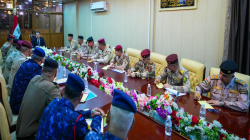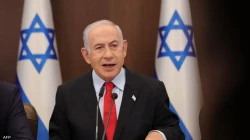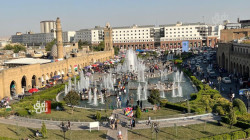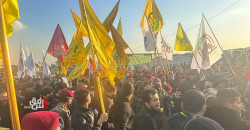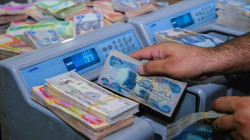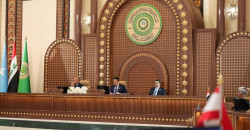Iraq’s complex role in regional crises: from humanitarian relief to political strategy
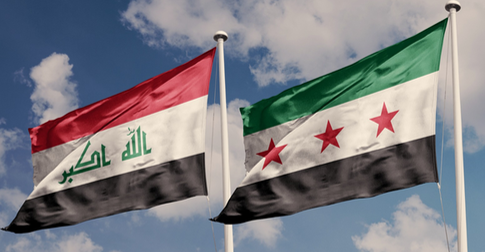
Shafaq News/ In response to the crises in Syria, Lebanon, and Gaza, Iraq has launched several initiatives aimed at delivering crucial humanitarian aid and political support. However, these efforts have sparked concerns about Iraq’s growing involvement in broader regional issues, the political dynamics behind these actions, and the potential repercussions, particularly as Iraq’s citizens face poverty and internal challenges.
Iraq’s Support to Lebanon and Gaza
Iraq has been actively supporting Lebanon and Gaza through various initiatives. Recently, the Iraqi government approved a voluntary 1% deduction from state employees' salaries to fund reconstruction and humanitarian efforts there.
In addition, Iraq is assisting Lebanon with its severe electricity crisis by providing heavy fuel oil under an agreement signed in July 2021. The deal allows Lebanon to import one million tons of fuel annually, a vital resource for the country’s power plants, which have been plagued by frequent blackouts and power cuts lasting up to 23 hours a day.
The deal was renewed until January 2025, ensuring Lebanon will have a steady supply of fuel oil to maintain its power grid.
At the time of its initial signing, the agreement was valued between $300 and $400 million, according to Raymond Ghajar, Lebanon's energy minister at the time. However, as fuel prices have risen, the value of the deal has increased to an estimated $570 million, as reported by Lebanon's current energy minister, Walid Fayad, in an interview with AFP last month.
Al-Rafidain Initiative
Last week, the Victory Alliance (Al-Nasr), led by former Iraqi Prime Minister Haider al-Abadi, announced the launch of the Al-Rafidain Initiative, which aims to provide humanitarian and political support to Syria.
In a statement received by Shafaq News, the coalition outlined two main components of the initiative, one focused on humanitarian aid and the other on supporting Syria’s democratic transition.
The humanitarian aspect includes the Al-Rafidain Relief Initiative, which will send essential supplies to the Syrian people, including heating fuel, basic medicines, and food.
The political component aims to establish a framework to support Syria's peaceful democratic transition and strengthen the Syrian state's unity and stability. The initiative also seeks to promote regional security and stability through cooperation with Iraq's neighboring countries, Egypt, and the UAE.
Al-Abadi emphasized Iraq's strategic position and importance, stating that Iraq must take a proactive role in regional developments. “Indifference represents a negative stance that could be filled by other powers.”
Syrian Turmoil and Regional Agendas
Political analyst, Diaa Abu Maarej al-Darraji, offered an overview of the situation in Syria, stating that the Iraqi government is currently monitoring developments without launching any initiatives. “Iraq’s primary focus is protecting its territory from armed groups and terrorism while emphasizing its commitment to Syria’s territorial integrity,” al-Darraji told Shafaq News.
He noted varying political stances within Iraq, with some leaders advocating for humanitarian aid and reopening trade routes with Syria due to its strategic location on the Mediterranean. This, he clarified, could enable the resumption of Iraqi oil exports halted since the Iran-Iraq war. Others, however, oppose engagement with the current transitional government, labeling it a terrorist organization.
Al-Darraji described the Syrian situation as "highly complex," adding that “Turkiye has supported Hayat Tahrir al-Sham to overthrow Bashar al-Assad’s regime, which in turn allowed Israeli forces to deepen their presence in Syria and destroy nearly 80% of Syria’s air defense systems, heavy weaponry, and fighter jets.”
Regarding the US's role in Syria, al-Darraji described it as "dual,", explaining that the US supports Hayat Tahrir al-Sham while pressuring the Kurdish-led Syrian Democratic Forces to withdraw from territories they had advanced into after Assad’s fall. These moves, he suggested, reflect efforts to influence Syria’s political future without directly engaging in a sectarian civil war—"a scenario encouraged by Israeli policies to secure its borders and expand its presence in Syria, aligning with its long-term religious narratives.”
Stability in Syria Vital for Iraq
Ahmed al-Yasiri, head of the Arab Australian Center for Strategic Studies, considered the initiative critical for Iraq. He argued that Iraq needs to build a network of influence and relationships within Syria to mitigate the potential negative impacts of the ongoing situation there. Supporting humanitarian relief efforts, the political process, and democratic transition in Syria would also benefit Iraq, he told Shafaq News.
Al-Yasiri explained that Syria poses a security threat to Iraq, emphasizing that to avoid this, Iraq should focus on investing in areas of stability rather than solely addressing security concerns. "Any instability within Syria directly affects Iraq, as seen in the rise of ISIS, which stemmed from security gaps there," he pointed out.
Highlighting the importance of a coordinated approach to support Syria’s political and social stability, he stated, "This coordination should be part of an alliance, not an isolated effort—whether with the United States or within the Arab and Gulf framework—to avoid sensitivity around Iraq’s role."
Warning of potential repercussions for Iraq’s Kurdish issue if Syria's instability continues, the head of the Arab Australian Center for Strategic Studies stated that Turkish actions in northern Iraq could mirror those in Syria if Baghdad remains indifferent.
On minority communities, al-Yasiri pointed to the Alawites, Shias, and religious shrines in Syria, stressing the need for political and security guarantees to protect them. "These are Iraqi interests that don’t require billions of dollars but rather a focused political strategy," he concluded.
Iraqis Suffer as Millions Spent on Foreign Aid
Political analyst Mujasha al-Tamimi assumed that unlimited support for regional and foreign countries has contributed to the decline in the political system’s image and popularity among Iraqis. “While most Iraqi provinces suffer from high poverty rates, deteriorating services, and a lack of job opportunities, millions of dollars are being spent on regional countries that have caused political mistakes leading to their destruction and displacement."
Speaking to Shafaq News, al-Tamimi said that although Iraq is not responsible for these crises, it has shouldered a significant burden. He explained, "Iraq has become one of the leading contributors of financial aid, oil derivatives, and portions of food and medical supplies originally allocated for its own citizens."
"The loyalty of some political factions to external parties often prioritizes foreign support over their citizens. This aid to regional countries is frequently framed within religious or sectarian contexts, or stems from external pressure on these political forces," he indicated.
For his part, Former Iraqi MP Kamel, Nawaf al-Ghurairi condemned Iraq's interference in Syria, particularly the deployment of armed factions to the conflict over the years. "This involvement has created new enemies for the country," he told Shafaq News.
MP al-Ghurairi also criticized Iraq's recent donations to Lebanon, including salary deductions from government employees, calling them unnecessary. "Iraq’s people are exhausted, having endured years of hardship, including internal displacement, missing persons, and kidnappings—some of whom were held in Syrian prisons. This reflects the government’s failure to lead the country effectively and protect its people," the former MP said.
